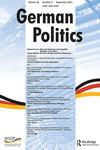Large-Scale and Green? The German Covid-19 Stimulus Package in International Comparison
IF 1.9
3区 社会学
Q2 POLITICAL SCIENCE
引用次数: 2
Abstract
ABSTRACT The Covid-19 pandemic is a major global crisis the impact of which is likely to exceed the upheavals caused by the last financial and economic crisis of 2008/2009. Germany as an export-oriented economy faces tremendous economic threats in the aftermath of the pandemic such as the collapse of global supply chains, the lockdown of economic sectors and impending job losses. As a reaction, the German government adopted, much as in the previous financial crisis, fiscal stimulus packages as part of a Keynesian-style public spending programme to stabilise its economy. Yet, in addition, the German government explicitly conceptualised its reactions as part of a ‘Package for the Future’ (Zukunftspaket), interlinking it with the second big global challenge: climate change and environmental degradation. We evaluate the German stimulus package on both these goals by comparing it with stimulus packages passed in other G20 countries. Based on a Qualitative Comparative Analysis (QCA) added by a case study of Germany, we identify the driving determinants behind the fiscal policy reactions with regard to the size of the stimulus package as well as its contribution to adopt long-term environmental transformations.大规模和绿色?德国新冠肺炎刺激计划的国际比较
本文章由计算机程序翻译,如有差异,请以英文原文为准。
求助全文
约1分钟内获得全文
求助全文

 求助内容:
求助内容: 应助结果提醒方式:
应助结果提醒方式:


